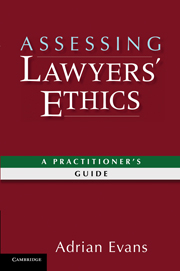Book contents
- Frontmatter
- Contents
- Preface
- List of figures
- Acknowledgements
- 1 An opportunity for law societies
- 2 Ethical failures, research and core qualities
- 3 Understanding ethical methods and types
- 4 Mechanisms to offset business pressure on legal ethics
- 5 Discovering practitioners' opinions about ethics assessment and psychological testing for integrity
- 6 Developing character
- 7 Measuring awareness of values and ethics
- 8 Entrenching ethics assessment
- Appendix A Research methods
- Appendix B Awareness of ethical type
- Appendix C Prototype scale of preference for legal ethical type
- Index
7 - Measuring awareness of values and ethics
Published online by Cambridge University Press: 10 January 2011
- Frontmatter
- Contents
- Preface
- List of figures
- Acknowledgements
- 1 An opportunity for law societies
- 2 Ethical failures, research and core qualities
- 3 Understanding ethical methods and types
- 4 Mechanisms to offset business pressure on legal ethics
- 5 Discovering practitioners' opinions about ethics assessment and psychological testing for integrity
- 6 Developing character
- 7 Measuring awareness of values and ethics
- 8 Entrenching ethics assessment
- Appendix A Research methods
- Appendix B Awareness of ethical type
- Appendix C Prototype scale of preference for legal ethical type
- Index
Summary
Towards assessment of lawyers' ethics
At the core of assessing lawyers' ethics are the problems of what attitudes and behaviours to assess in individual lawyers and deciding whether such ‘assessment’ is technically feasible. This task is more complex than assessing whether lawyers can remember professional conduct rules. Assessing knowledge of conduct rules is a simple cognitive process of memory testing, undertaken routinely at all levels of legal education. There is no agreement that the larger issues of complex judgment covered by legal ethics are more important than the limited purposes of conduct rules and there is no agreement that these deeper qualities require assessment, let alone as to the best approach to such assessment. Even if such agreement emerges and assessment includes a commitment to some or all of the measures recommended in earlier chapters, the issue of technical feasibility remains.
Economides and Rogers refer to these technical issues as ‘notoriously difficult, if not impossible’, but they acknowledge that ‘part of the problem is a lack of familiarity with qualitative assessments as credible and valid evaluation tools’, and they might also agree with Myles and Huberman that in the context of research investigation, the combination of both qualitative and quantitative methods reduce the risks of relying on either strategy alone. This is why the approach to assessment proposed throughout this book involves both. In this chapter also, qualitative and quantitative methods are discussed.
- Type
- Chapter
- Information
- Assessing Lawyers' EthicsA Practitioners' Guide, pp. 188 - 224Publisher: Cambridge University PressPrint publication year: 2010
- 1
- Cited by



